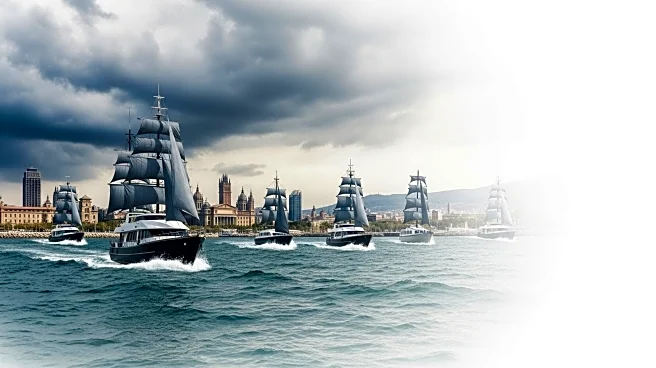What's Happening?
An aid flotilla aiming to break Israel's naval blockade of Gaza has returned to Barcelona after encountering stormy weather. The Global Sumud Flotilla, carrying activists including Greta Thunberg, initially set sail with the goal of delivering humanitarian aid and symbolically opening a corridor to Gaza. The mission, described as the largest solidarity effort in history, involves participants from 44 countries and plans to resume once conditions improve. The flotilla's name, 'sumud,' signifies determination and resistance, reflecting the Palestinian struggle.
Why It's Important?
The flotilla's mission highlights the ongoing humanitarian crisis in Gaza and the international community's response. Attempts to break the blockade draw attention to the severe conditions faced by Palestinians, including food shortages and malnutrition. The involvement of prominent figures like Greta Thunberg amplifies the message, potentially influencing public opinion and diplomatic efforts. This initiative may impact future discussions on the Israeli-Palestinian conflict, encouraging dialogue and action to address humanitarian needs.
What's Next?
Organizers plan to resume the flotilla's journey once weather conditions improve, with additional vessels joining from ports in Italy, Greece, and Tunisia. The Israeli military is likely to intercept the flotilla, as has occurred in previous attempts. The mission's progress and any resulting confrontations could affect international relations and provoke responses from governments and humanitarian organizations. Continued efforts to break the blockade may lead to increased diplomatic pressure on Israel to ease restrictions on Gaza.
Beyond the Headlines
The flotilla's mission raises questions about the intersection of humanitarian aid and political activism. While the initiative aims to provide relief, it also serves as a protest against Israeli policies. This dual purpose may influence perceptions of the mission, affecting how stakeholders engage with the issue. The broader implications of such actions could impact future humanitarian efforts in conflict zones, prompting discussions on the role of activism in addressing global crises.










